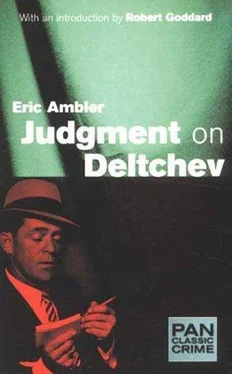Eric Ambler - Judgment on Deltchev
Здесь есть возможность читать онлайн «Eric Ambler - Judgment on Deltchev» весь текст электронной книги совершенно бесплатно (целиком полную версию без сокращений). В некоторых случаях можно слушать аудио, скачать через торрент в формате fb2 и присутствует краткое содержание. Год выпуска: 1977, ISBN: 1977, Издательство: Vintage, Жанр: Криминальный детектив, на английском языке. Описание произведения, (предисловие) а так же отзывы посетителей доступны на портале библиотеки ЛибКат.
- Название:Judgment on Deltchev
- Автор:
- Издательство:Vintage
- Жанр:
- Год:1977
- ISBN:9780307049971
- Рейтинг книги:4 / 5. Голосов: 1
-
Избранное:Добавить в избранное
- Отзывы:
-
Ваша оценка:
- 80
- 1
- 2
- 3
- 4
- 5
Judgment on Deltchev: краткое содержание, описание и аннотация
Предлагаем к чтению аннотацию, описание, краткое содержание или предисловие (зависит от того, что написал сам автор книги «Judgment on Deltchev»). Если вы не нашли необходимую информацию о книге — напишите в комментариях, мы постараемся отыскать её.
Judgment on Deltchev — читать онлайн бесплатно полную книгу (весь текст) целиком
Ниже представлен текст книги, разбитый по страницам. Система сохранения места последней прочитанной страницы, позволяет с удобством читать онлайн бесплатно книгу «Judgment on Deltchev», без необходимости каждый раз заново искать на чём Вы остановились. Поставьте закладку, и сможете в любой момент перейти на страницу, на которой закончили чтение.
Интервал:
Закладка:
The old woman had stopped to bolt the door again, but now she straightened up and faced me grimly, her arms folded, her eyes bright and full of malice. She said something that must have been, ‘Well, now you’re in, what do you want?’ In German I replied that I did not understand. She did not understand that. I got out Petlarov’s letter addressed to Madame Deltchev and gave it to her. She took it in her clawed, arthritic hands and looked without comprehension at the writing. I guessed that she could not read. She looked up at me suspiciously for a moment, then held up a hand for me to wait and clacked away round the side of the house.
I rubbed my shoulder and looked at the front of the house. It was about twenty feet from the wall, a blank symmetrical façade in grey stone with white painted metal shutters fastened over all the windows. Double steps curved up to the front door, which was flanked by potted azaleas and looked as if it were rarely opened. I heard the old woman’s footsteps on a bare floor inside and a distant murmur of voices. Then for a bit there was silence. I was a small boy again, calling for a friend with rich parents.
The breeze stirred the leaves of the cherry tree and there were other footsteps inside the house. A moment or two later the front door opened and a girl came out. At the top of the steps she paused.
‘Herr Foster?’
‘Yes.’
She came down the steps with the preoccupied frown of a busy person whose time is being wasted. She was in the early twenties, dark and very pale, with high Slavik cheekbones. It was an intelligent face, too, but had an expression of bland self-assurance too determined to be real.
‘I am Katerina Deltchev,’ she said.
‘I’m glad to meet you.’ She had only a remote facial resemblance to her father.
‘What is it you wish, Herr Foster?’
‘To see your mother. Perhaps Petlarov’s letter did not explain that.’ I knew that it did.
‘At the moment I am afraid that is quite impossible. She is very upset, you understand.’
‘Naturally. Is she specially upset today?’
‘Please?’
‘I am sure that these are all terrible days for her. I merely wondered if the proceedings today had specially affected her.’
‘I don’t think so.’
‘Then perhaps you would ask her when I may see her, Fräulein.’
‘I can tell you anything you wish to know, Herr Foster.’ She smiled, but not very warmly. ‘Would you like a drink?’
‘No, thank you. Are you quite sure that your mother wishes to be protected from someone who may be of help to her?’
‘I don’t understand.’
‘If you will take Petlarov’s letter to her, I’m sure she will explain to you.’
She stopped smiling. ‘My mother does not see journalists.’
‘So I believe. That is why Petlarov gave me the letter to her.’
She hesitated, then pressed her lips together. ‘Very well. Please wait.’
She turned on her heel and went into the house again. She was wearing neat white shorts, a maillot and sandals. I felt a little sorry for her. It is difficult, even for an attractive young woman, to make a dignified exit in shorts.
I waited a few more minutes. The light was going. Then the front door opened again and this time the old woman came out. She beckoned to me and I followed her.
Inside, there was a large hallway, with curtained doorways on either side and a slippery hardwood floor. There was a radiator against the wall between two of the doors. It was all very clean and smelt of polish. Motioning me to follow her, the old woman climbed up the stairs. On the landing there was a shuttered window, and by the half-light filtering through the slits in the metal I could see a passage running along the width of the house. The old woman turned to the right along it and, going to a door at the end, scratched on the panel. There was a voice from within. She opened the door.
Red light from the setting sun streamed into the passage through tall unshuttered windows in the room beyond, and as I came to the doorway I could see the bare khaki hills outside the city.
The windows gave onto a wooden terrace with an awning and vines growing over trellises at the sides. There was an iron table there with books on it and some cane chairs.
The room was large and filled with massive red plush drawing-room furniture of the kind made for the wealthy tradesmen of pre-Sarajevo Vienna. On the walls there were heavy gilt mirrors and girandoles, and coloured prints in polished wood and ormolu frames. Overhead there was a large gilt electric chandelier. The upholstery was red cut velvet. In winter the room would be quite cheerless, but now with the windows opened on the terrace and with the gilt touched by the glow of the sunset it had a certain richness and warmth.
As I came into the room, a woman sitting just out of the sun by the far window put a book down and rose to her feet.
I had a slight shock.
She was someone who had once been a provincial schoolteacher. Petlarov had said, ‘Perhaps if she had married me instead of Yordan, I should have become a Minister.’ There was the diabetic husband under sentence of death. There was my pilgrimage to this house to see her and my interview with the attractive young woman whose mother did not see journalists. There was the quiet shuttered house, the smell of furniture polish. Out of all these things an image of the Madame Deltchev I would find had been composed in my mind’s eye. She had been an old woman with white hair, in a wheelchair perhaps or even bedridden; a wiry matriarch with the evidence of her youthful beauty still discernible in her face, and the vitality, which had served the young lawyer and then driven the ambitious politician, still there in the brightness of her glance and the impatient directness of her speech. How this irascible crone had borne a daughter twenty years ago or what disease now immobilized her my untidy imagination had not troubled to enquire. What I was prepared for in Madame Deltchev was the female counterpart of the grey, shaking man I had seen in court that day and with whose mystery and fate I was preoccupied; and I had visualized no other.
What I saw was a slim, erect woman of about fifty in a striped silk blouse and well-cut skirt, and with sleek, black hair only slightly touched with grey. Her forehead was broad and high and she had gentle, very intelligent eyes. The bold regular features, which her daughter had inherited, were in her more masculine, but her complexion was perfect.
She smiled politely as she greeted me. ‘Herr Foster, I’m so sorry that you were kept waiting outside.’
‘It’s very kind of you to see me.’
‘Please sit down.’ She sat down again herself. She had a small lace fan that she fluttered unobtrusively by the side of her face farthest from me. ‘My daughter had the best of intentions, but she did not understand Petlarov’s motives.’
The girl stood behind the chair. She did not look at me.
‘With Petlarov,’ she said angrily, ‘there is only one motive. He does only what he is paid for.’
Her mother said quietly, ‘Please get us some tea, Katerina.’
Katerina laughed shortly. ‘English journalists drink only whisky and soda, Mother. It is traditional.’ She went over to the samovar. ‘Isn’t that right, Herr Foster?’
Madame Deltchev frowned and said something quickly in their own language. The girl made a sharp retort. Madame Deltchev smoothed her hair.
‘I think that Herr Foster will excuse you, Katerina, if you wish to leave us to talk,’ she said calmly.
The girl stood still looking at her for a moment, her face dark with anger. Then with a bang she put down the tea glass she had been holding and walked out of the room.
Her mother rose and, going over to the samovar, began to pour the tea herself.
Читать дальшеИнтервал:
Закладка:
Похожие книги на «Judgment on Deltchev»
Представляем Вашему вниманию похожие книги на «Judgment on Deltchev» списком для выбора. Мы отобрали схожую по названию и смыслу литературу в надежде предоставить читателям больше вариантов отыскать новые, интересные, ещё непрочитанные произведения.
Обсуждение, отзывы о книге «Judgment on Deltchev» и просто собственные мнения читателей. Оставьте ваши комментарии, напишите, что Вы думаете о произведении, его смысле или главных героях. Укажите что конкретно понравилось, а что нет, и почему Вы так считаете.












